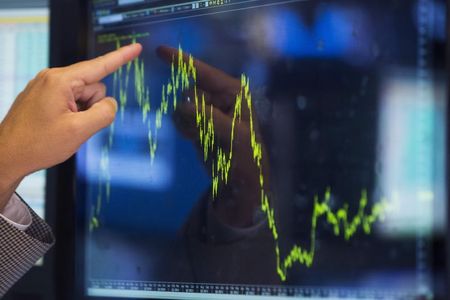Risks for Tech correction are mounting despite strong fundamentals By Investing.com


Risks for a correction in technology equities are increasing despite the sector’s robust fundamentals, Barclays strategists warned on Tuesday.
“Fundamentally, Tech and Big Tech remain the bright spot of the US equity market,” Barclays wrote. In the first quarter of 2024, Big Tech companies were central to the ‘s margin recovery, driving a third straight quarter of positive operating leverage. Moreover, nearly 90% of the sector exceeded consensus earnings per share (EPS) estimates.
However, Barclays points to several key risks that could precipitate a tech correction. One major concern is the high concentration risk.
Specifically, the bank highlighted that the Leadership Gap measure between the top six stocks and the rest of the S&P 500 had reached the 94th percentile by the end of May, up from the 70th percentile in January.
“Based on previous episodes of stretched narrow leadership (2000 and 2020), we would expect the market leaders to give back some of their excess returns in the near to medium term,” Barclays strategists said.
Positioning risk is another significant factor. For instance, Barclays observes that equity exposure within volatility control and Commodity Trading Advisors (CTAs) remains quite high, with asymmetry of flows clearly tilted to the downside.
Furthermore, mutual funds started the year with heavy consensus overweight allocations to Tech and Big Tech, and have increased those weightings even further through the first and second quarters of 2024. As a result, the active weight on Big Tech among equity mutual funds is now more concentrated than ever.
Barclays also highlighted risks stemming from the upcoming US election. With the first presidential debate scheduled for June 27, tech companies are vulnerable to increased rhetoric around tariffs and changes in international taxation. Barclays highlights that in a Trump win scenario, tech appears most at risk of increased US protectionism given its dependency on global supply chains. Conversely, a Biden victory could bring adverse changes in international taxation, such as raising the global intangible low-taxed income (GILTI) rate to 21%.
Meanwhile, the potential for higher Treasury yields points to a duration risk.
“With equity/rates correlation being the most negative in at least two decades, it is not surprising that US equities made new all-time highs as rates moved lower in the past two month,” said Barclays in the note.
“The high valuation of Tech, however, while fundamentally justified by structural tailwinds, makes it particularly vulnerable to a potential reversal higher in the Tsy yields,” it added.
Lastly, the bank’s strategists said there is also a risk of spill-over from Europe. Recent political developments in Europe, particularly the call for snap parliamentary elections in France, have been poorly received by markets there but have not yet significantly impacted US equities.
“Indeed, last week the average underperformance of a mix of CAC/SXXP (EuroStoxx600), NKY, and HSCEI was the sixth largest in sigma terms since 1987,” strategists said.




